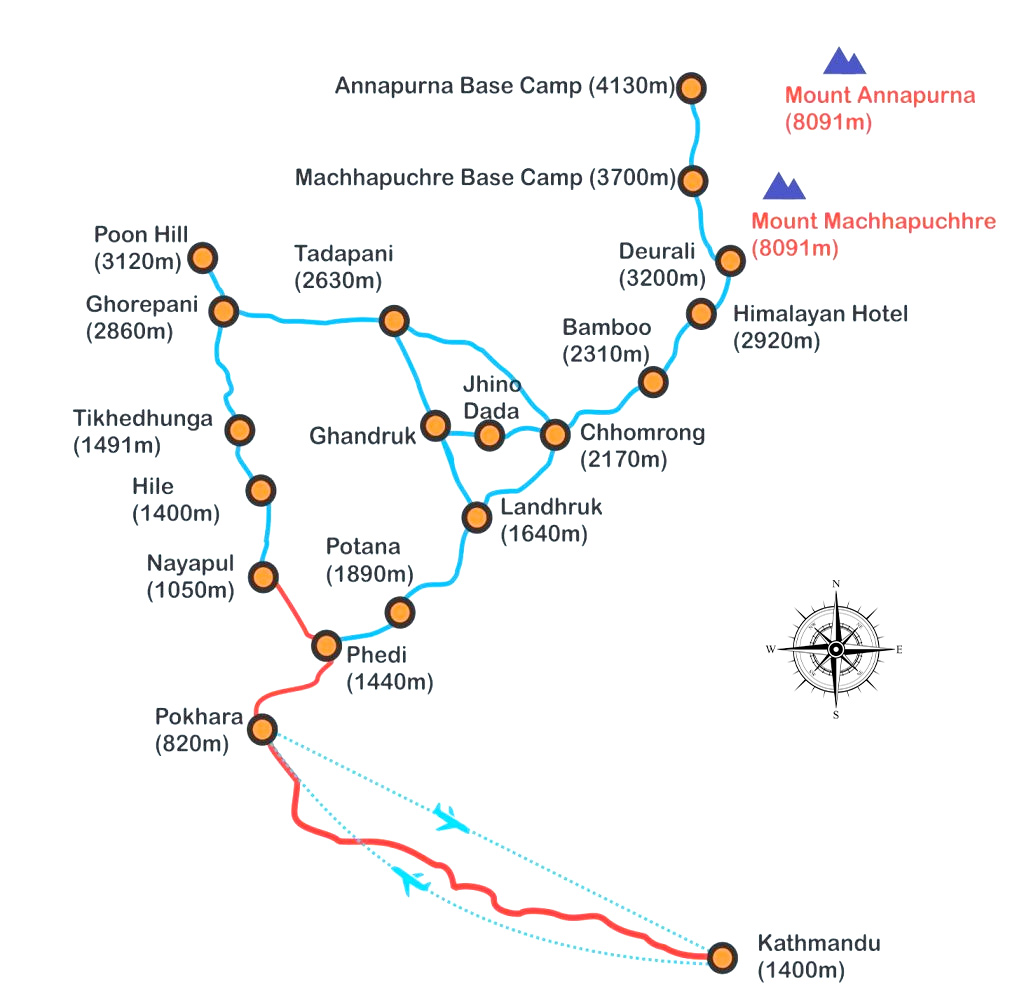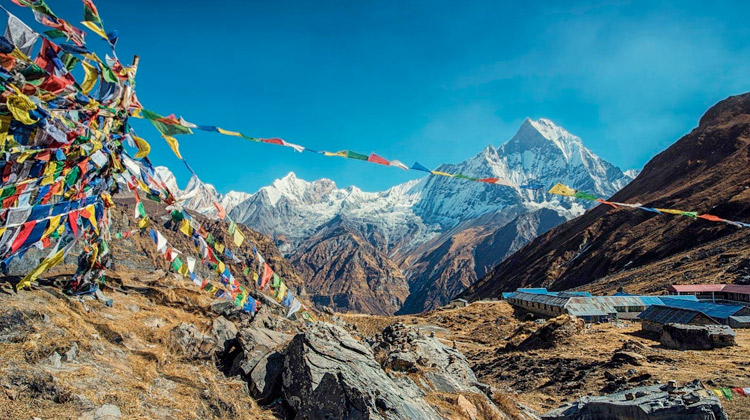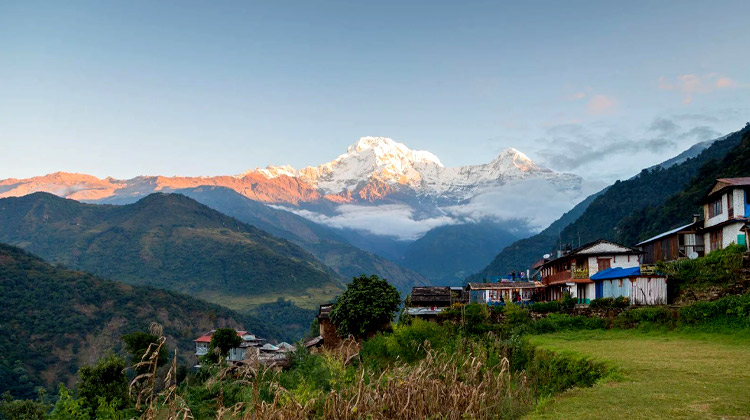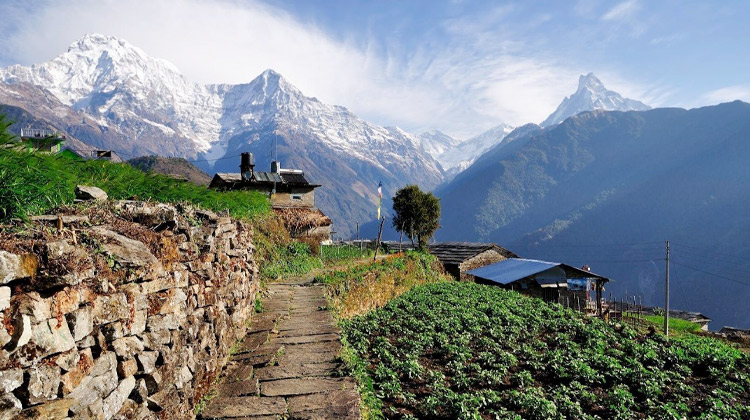Trip Overview
Annapurna Base Camp Trek is a classic 7–12 day lodge-to-lodge trek in central Nepal that leads into the heart of the Annapurna Sanctuary, ending at Annapurna Base Camp at 4,130 m (13,550 ft) beneath Annapurna I, the world’s tenth-highest peak at 8,091 m. The route passes through terraced farmland, dense rhododendron and bamboo forests, and traditional Gurung and Magar villages before reaching a dramatic high-altitude amphitheater of glaciers and 7000–8000 m Himalayan summits.Classed as a moderate trek, ABC involves 5–7 hours of walking per day on stone steps and well-established mountain trails, with steady but manageable altitude gain for most reasonably fit trekkers. Comfortable teahouse accommodation, hot meals, and a lower maximum altitude compared to routes like Everest Base Camp make it suitable for first-time Himalayan trekkers, families, students, and active older travelers.
Mountain Trekking Nepal offers flexible Annapurna Base Camp trek departures for 2026/2027 from Kathmandu and Pokhara, including all necessary permits, experienced local guides, porters, and logistics. The itinerary below is optimized for gradual acclimatization, scenic variety, and time to enjoy highlights like Ghorepani–Poon Hill, Machhapuchhre Base Camp, Annapurna Sanctuary, and the natural hot springs at Jhinu Danda.
Highlights of the Annapurna Base Camp Trek
- Classic Annapurna Base Camp trek into the heart of the Annapurna Sanctuary (4,130 m)
- Panoramic close-up views of Annapurna I, Annapurna South, Hiunchuli, and Machhapuchhre (Fishtail)
- Scenic drive or flight between Kathmandu and Pokhara, then trek through traditional Gurung and Magar villages
- Lush rhododendron and bamboo forests, terraced fields, and river valleys along the Modi Khola
- Sunrise and sunset views from Annapurna Base Camp, surrounded by 7000–8000 m Himalayan peaks
- Overnight at Machhapuchhre Base Camp and ABC for a full high-Himalayan experience
- Relaxing in natural hot springs at Jhinu Danda at the end of the trek
- Comfortable teahouse accommodation with hearty Nepali and international meals each day
- Moderate-level trek suitable for fit beginners, families, and active older trekkers
- Flexible itinerary options from Pokhara or Kathmandu with experienced local guides and porters
Itinerary
Cost Include
Permits & paperwork
- Annapurna Conservation Area Permit (ACAP)
- Trekkers’ Information Management System (TIMS) card
Accommodation
- Tourist-standard hotel in Kathmandu and Pokhara on a bed & breakfast basis (number of nights as per final itinerary).
- Twin-sharing rooms in local teahouses/lodges during the trek.
Meals during the trek
- Three meals a day (breakfast, lunch, dinner) in teahouses along the route, with tea/coffee at meals.
Guide & porter services
- Licensed, English-speaking trekking guide experienced on the Annapurna Base Camp route.
- Porters with appropriate equipment and insurance (typical porter load up to about 20–22 kg shared between two trekkers).
Transport
- Kathmandu–Pokhara–Kathmandu by tourist bus or as specified.
- Private vehicle transfers between Pokhara and trek starting/ending points (e.g., Nayapul / Jhinu / other local roadheads).
- Airport–hotel–airport transfers in Kathmandu and Pokhara, where required.
Insurance & staff support
- Trekking, medical, and accidental insurance coverage for guides and porters.
- Staff daily wages, meals, accommodation, and ground transport.
Company services & taxes
- All government taxes and applicable service charges.
- Trek coordination, route planning, and 24/7 local support while on trek.
Cost Exclude
- International flights to/from Nepal.
- Nepal entry visa fees.
- Lunch and dinner in Kathmandu and Pokhara (except where explicitly included).
- Personal trekking equipment (clothes, boots, backpack, sleeping bag, poles, etc.).
- Personal travel insurance covering trekking and emergency evacuation (mandatory recommendation).
- Emergency rescue/evacuation, medical treatment, or hospitalization.
- Bottled drinks, bar bills, mineral water, and snacks beyond included meals.
- Hot showers, battery charging, Wi-Fi, and the use of electronic devices are available at lodges that charge extra.
- Tips for guides, porters, and drivers (customary in Nepal).
- Filming/photography permits for professional or commercial use inside the conservation area, if applicable.
Fixed Depature
Official Annapurna Base Camp Trek Map

Equipment list for Annapurna Base Camp Trek
This checklist is designed to help you prepare for a trekking holiday in Nepal, with additional notes for those attempting to summit a trekking peak. It's reassuring to know that high-quality gear, including outdoor clothing and sleeping bags, can be conveniently rented in Kathmandu.
Most treks will be in lodges or teahouses, which offer basic rooms with two single beds and mattresses. These lodges, with their cozy rooms and provided blankets, ensure a comfortable stay, making your trek a more enjoyable experience. A good-quality three-season sleeping bag should suffice. However, for trekking peaks, you'll generally set up base camp with tents, necessitating a warmer sleeping bag, a liner to enhance its warmth, and a sleeping mattress.
| TRAVEL DOCUMENTS | HEAD |
| Debit/Credit Cards | Sun Cap |
| PP Size Photo (2 Pieces) | Fleece Hat/ Warm Hat (1-2 Pcs) |
| Insurance Paper And Contact Address. | Neck Gaiter (2 Pcs) |
| Family Members / Company’s Contact | Head Lamp with extra batteries |
| Address | Sun Glasses (UV Protection) |
| Travel Insurance | Balaclava |
| HANDS AND FEET | UPPER BODY |
| Light Liner & Down Gloves | Thermal Top Base Layer (2 Pcs) |
| Normal Socks (5-6 Pairs) | Fleece Jacket (1 Pcs) |
| Trekking Shoes | Gore Tex Jacket (1 Pcs) |
| Slipper (1 Pair) | Down Jacket (1 Pcs) |
| Camp Shoes | Quick Dry T-Shirt (2 Pcs) |
| Hiking Boot with ankle support | Wind breaker/Windproof Jacket |
| LOWER BODY | PERSONAL EQUIPMENT |
| Thermal Bottom Base Layer (2 Pcs) | Down Sleeping Bag -10°C to -20°C |
| Fleece Trouser (1pcs) | Headlamp (Rechargeable Batteries) |
| Gore Tex Pant (1 pcs) | Trekking Pole |
| Light Weight Quick Dry Trekking Pants(2-3 Pairs) | Rucksacks 35L - 45L/Day Bag |
| Gaiters for trekking boots | Rain Pancho & Umbrella |
| Under Wear (4 pcs) | Powerbank |
| EATING & DRINKING | TOILETRIES |
| Energy Bar | Hand Disinfectant |
| Snacks | Wet Tissue |
| Water Bottle | Tooth Paste & Tooth Brush |
| Thermos | Soap & Shampoo |
| MEDICAL/FIRST AID | MISCELLANEOUS |
| Severe Pain Killer (Flexon) | Lip Balm |
| Mild Pain Killer (Paracetamol) | Sunscreen |
| Throat Lozengen (Strepsils) | Moisturizer |
| Lubricating Eye Drop (Artificial Tear) | Quick Dry Towel |
| Antacid Tab | Trails Maps |
| Electrolyte Tab | Trekking Poles |
| Handy Plast | Sun Cream (30-50 Spf) |
| Blister Blast | Lip Guard (30-50 Spf) |
| Crep Bandage (Elastic Bandage) | Sun Glasses (UV Protection) |
FAQ
The Annapurna Base Camp Trek is a popular trekking route in Nepal that leads to the base camp of Annapurna, one of the highest peaks in the world. The trek offers stunning views of the Annapurna and Dhaulagiri mountain ranges.
The Annapurna Base Camp Trek typically takes 7-12 days, depending on the chosen itinerary and starting point.
The best times to trek are during the pre-monsoon (March to May) and post-monsoon (September to November) seasons when the weather is stable and views are clear.
Trekkers need two permits: the Annapurna Conservation Area Permit (ACAP) and the Trekkers' Information Management System (TIMS) card.
The trek is considered moderately complex. It involves significant elevation gain and long days of walking, but no technical climbing skills are required.
Regular cardiovascular exercises such as running, cycling, or hiking, strength training, and some trekking experience can be beneficial.
Essential gear includes trekking boots, warm clothing, a good-quality sleeping bag, trekking poles, a backpack, and rain gear. A detailed packing list should be checked prior to departure.
Yes, many trekking shops in Kathmandu and Pokhara rent and sell gear.
While it's possible to trek independently, hiring a guide or porter can enhance your experience, provide local insights, help you navigate, and ensure safety.
Altitude sickness is a risk above 2,500 meters. Proper acclimatization, including rest days, staying hydrated, and ascending gradually, is important. Medications like Diamox can also help.
Some tea houses offer Wi-Fi for a fee, but connectivity can be slow and unreliable. Mobile network coverage is available in some areas but could be more consistent.
Charging facilities are available at tea houses, usually for a small fee. It's a good idea to bring extra batteries or a solar charger.









 Share
Share
 Download
Download












